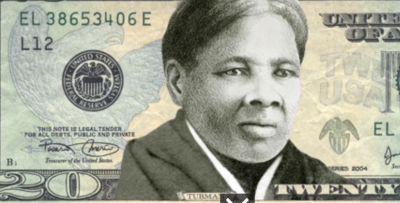
By Leon Thompson
May 14, 2015 (Washington D.C.) – A group that wants to kick Andrew Jackson off the $20 bill and replace him with a woman has, after months of collecting votes, chosen a successor: Harriet Tubman.
Tubman was the choice of hundreds of thousands of voters in an online poll by Women on 20s that started with 15 worthy candidates. Any of the final four would have been wonderful choices. The other three finalists were former first lady Eleanor Roosevelt, civil rights activist Rosa Parks, and Wilma Mankiller, Chief of the Cherokee Nation.
Tubman is certainly an excellent choice and risked her life many times for others. Tubman is an especially good choice because with every $20 dollar bill with her likeness on it, we will be reminded about the good that came out of the Civil War.
How many slave owners have had their portraits on our currency? Jackson was a slave owner and made his fortune on slave labor. How many American Indians died due to Jackson’s order to forcibly remove Cherokees, leading to the Trail of Tears? It's easy to find reasons to suggest that he is overdue for retirement from the $20 dollar bill. His passionate support of the measure that led to the Trail of Tears and anti-Native American policies is first among them.
But do we truly want to highlight parts of our history like slavery and genocide with heroes and champions of those shameful eras? It's time to turn the pages in our history books to positive examples of justice.
Most importantly Harriett Tubman on the $20 dollar bill in place of Andrew Jackson is making a statement about our values.
After she escaped the slavery she was born into in Maryland, Tubman returned to the South at great risk to herself, over and over again. She made 19 trips to the South, rescuing 300 slaves from captivity including her parents. She is said to have a perfect record as a conductor for the Underground Railroad.
During the Civil War, Tubman worked for the Union army, at first as a cook and nurse. She was recruited to work as a spy for the Union. As the Smithsonian magazine wrote, Tubman became the first woman in U.S. history to lead a military expedition when in 1863 she lead a brigade of Union soldiers to free more than 750 slaves.
Despite all this, Tubman struggled to receive any compensation from the government for her time serving the Union. She successfully petitioned Congress for a raise on the pension she received for the service of her second husband, initially $8 a month, to $25 a month. Tubman still never received a pension for her own considerable military service. Harriet Tubman died in 1913.
In Tuesday's White House press briefing, Press Secretary Josh Earnest said that Tubman was a "wonderful choice" for the bill, but stopped short of saying whether the President backs putting Tubman on the $20.
Hillary Clinton tweeted, “Harriet Tubman could be the first woman on the $20 bill. Awesome, well deserved - and about time.”
The Women on 20s campaign aimed to change the portrait on the $20 bill for a couple of reasons: First, the 100th anniversary of the ratification of the 19th Amendment granting women the right to vote is in 2020.
Second, while Jackson may have been a relatively uncontroversial choice for the honor when he was selected in 1929, he was an enthusiastic supporter of policies that were harmful to the Native American population, including the measure that led to the Trail of Tears.
For that latter reason, Women on 20s is not the first to suggest that it might be time to retire the Jackson $20 dollar bill.
If the government agrees that it's time to replace Andrew Jackson on the bill, its choice might not end up being Tubman. But the idea of putting a woman on America's paper currency has attracted some notable support.
President Obama said in a July speech in Kansas City, before the launch of the Women on 20s voting campaign. "Last week, a young girl wrote to me to ask why there aren’t any women on our currency, and then she gave me a long list of possible women to put on our dollar bills and quarters and stuff -- which I thought was a pretty good idea."
Although the Women on 20s campaign plans to petition the White House, it is the Treasury Department that ultimately makes decisions on which bills feature which portraits. The last overhaul of paper money portraits by the department was in the 1920's, when Jackson replaced Grover Cleveland on the $20.
“Our paper bills are like pocket monuments to great figures in our history,” Women on 20s Executive Director Susan Ades Stone said in an e-mailed statement. “Our work won’t be done until we’re holding a Harriet $20 dollar bill in our hands in time for the centennial of women’s suffrage in 2020.”
For more see:
http://www.msnbc.com/msnbc/voters-pick-harriet-tubman-20-dollar-bill?cid=eml_mda_20150514
The views in this editorial reflect the views of the author and do not necessarily reflect the opinions of East County Magazine. To submit an editorial for consideration, contact editor@eastcountymagazine.org .











Recent comments